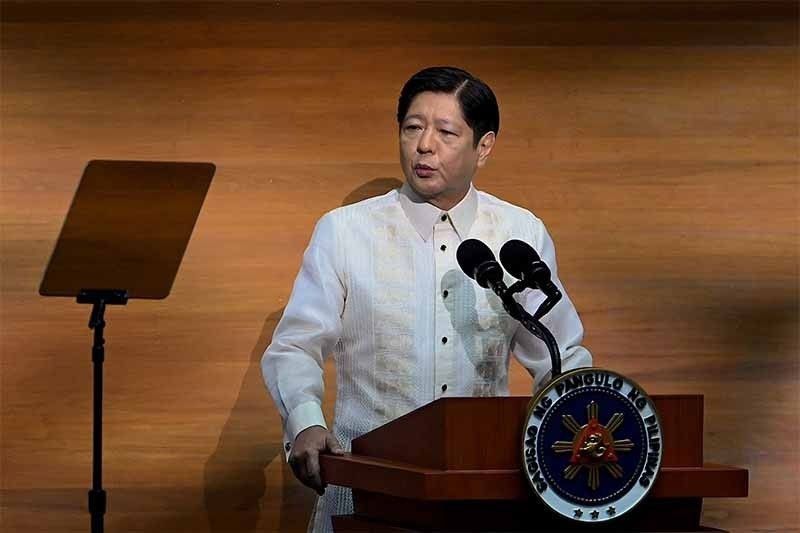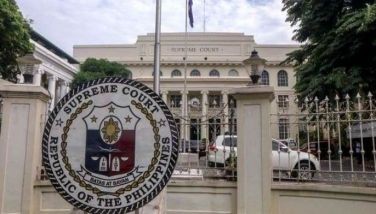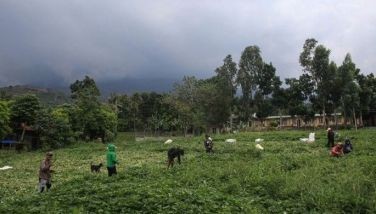President Marcos orders DTI, DA to monitor rice prices

MANILA, Philippines — President Marcos has vowed to crack down on rice hoarding and price manipulation and ordered the close monitoring of rice prices following reports that prices of the staple food are hitting as high as P56 per kilo.
In a statement issued by the Presidential Communications Office (PCO) yesterday, Marcos, concurrently the agriculture secretary, said the country’s rice supply is sufficient, but prices are “very variable.”
“The government is working with the private sector to rationalize the prices and make available affordable rice in the market and in Kadiwa,” he added.
Kadiwa is a program that seeks to provide consumers access to affordable and quality goods and help farmers sell their products.
Marcos has also issued a warning against rice hoarders and price manipulators who take advantage of the lean months before the harvest season, according to PCO Secretary Cheloy Garafil.
Garafil added that the Chief Executive has likewise ordered the Departments of Agriculture (DA) and Trade and Industry (DTI) to closely monitor the prices of rice in various markets.
There have been reports that rice prices have reached P56 per kilo because of price manipulation and hoarding.
DA deputy spokesman Rex Estoperez, however, assured the public that the government is working to stabilize prices and is verifying reports about practices that are supposedly affecting the prices of the staple, which include the stockpiling of rice, the overpricing of stocks and selling of rice in low quantities.
The DA has reported that retailers are selling rice at different prices, with some selling at P38 to P40 per kilo as the cheapest and some selling their cheapest variety at P50 per kilo.
During his second State of the Nation Address last month, Marcos warned smugglers and hoarders of agricultural goods that their days are numbered, chiding them for causing the rise in the prices of commodities.
The President also ordered the Department of Justice and National Bureau of Investigation to look into the smuggling, hoarding and price fixing of onion and other agricultural products after Marikina City 2nd District Rep. Stella Luz Quimbo told him that there was “substantial evidence” pointing to the existence of a cartel.
SRP hikes on hold
Meanwhile, adjustments in the suggested retail prices (SRPs) of basic necessities and prime commodities (BNPCs) are currently on hold, according to Trade Secretary Alfredo Pascual.
“There are pending requests for increases, but we are trying to see whether there is a real basis for the request in the adjustment of the suggested retail prices,” Pascual said during the Kapihan sa Manila Bay forum yesterday.
He added that when he recently convened his team, they decided to put the price adjustments on hold.
“And now, we’re monitoring the movements of oil prices and all other important inputs,” Pascual said. “If we detect that there is a basis, then we will again sit down and decide, which requests for price adjustments we will consider.”Earlier this month, Consumer Protection Group Undersecretary Ruth Castelo said 13 manufacturers of BNPCs have pending price increase requests covering a total of 43 shelf keeping units (SKUs), which include various products such as canned sardines, evaporated milk, powdered milk, coffee, instant noodles, bottled water and canned meat.Castelo added that manufacturers of food items are requesting a one-percent to five-percent price increase, or from P0.10 to P7.27.
In contrast, non-food item manufacturers are requesting a six-percent to 10-percent price increase, or from P1.50 to P9.75.
Asked about the reasons for the price increase requests, Castelo said manufacturers stated high raw material costs, especially those being imported.She stressed that the DTI has a mechanism to verify the price increase requests of manufacturers.
At the same forum yesterday, Pascual shared plans of establishing around three food terminals in Metro Manila, in line with the DTI’s proposed food logistics action plan.
“One of the solutions that we are now in the process of implementing is trying to link retailers, particularly institutional retailers, like chains of supermarkets that have presence all over the country. There are a number of them now. So there will be good competition among them,” he said.
The trade chief highlighted the Nueva Vizcaya Agriculture Terminal (NVAT) as an example of a food terminal where farmers are able to bring their harvests and traders go there to buy.
“And our team has gotten one supermarket chain to sign an agreement with the terminal, so they will buy directly from the producers that are bringing their products to this NVAT,” Pascual said.
“That is the basis of the approach that we are going to implement to be able to address the price gap between farm gate and retail. Those two things, direct linkage and the use of terminals where farmers can bring their produce,” he added. — Catherine Talavera
- Latest
- Trending




























